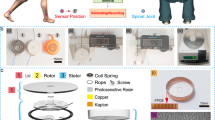Abstract
Measurement of body motion is required in professional and amateur sports and in health-care services for the improvement and evaluation of human motion. This study proposes a method for measuring joint angles. The key device in this method is a stretchable strain sensor. The strain sensor stretches over 200% under strain with low elasticity and measures the amount of strain with high accuracy. The key advantages of the strain sensor are its thinness, light weight, and low elastic modulus. If the strain sensor is attached on human skin over a joint, it does not impede joint motion and can therefore measure the stretch of the skin. The proposed method estimates the joint angle from skin stretching based on simple mechanical models. In an experiment, the strain sensors were applied to knee and ankle joints. The average error between the estimated angles and reference joint angles measured by motion capture was within 5°.







Similar content being viewed by others
References
Biometorics Ltd (2018) Goniometers. Biometerics Web. http://www.biometricsltd.com/goniometer.htm. Accessed 14 Jan 2018
Cai L, Song L, Luan P, Zhang Q et al (2013) Super-stretchable, transparent carbon nanotube-based capacitive strain sensors for human motion detection. Sci Rep 3:3048. https://doi.org/10.1038/srep03048
Chossat JB, Park YL, Wood RJ, Duchaine V (2013) A soft strain sensor based on ionic and metal liquids. IEEE Sens J 13:3405–3414. https://doi.org/10.1109/JSEN.2013.2263797
Cochrane C, Koncar V, Lewandowski M, Dufour C (2007) Design and development of a flexible strain sensor for textile structures based on a conductive polymer composite. Sens 7:473–492. https://doi.org/10.3390/s7040473
Ferrandez-Pastor FJ, Mora-Mora H, Sanchez-Romero JL (2017) Interpreting human activity from electrical consumption data using reconfigurable hardware and hidden Markov models. J Ambient Intell Human Comput 8:469–483. https://doi.org/10.1007/s12652-016-0431-y
Gibbs PT, Asada HH (2005) Wearable conductive fiber sensors for multi-axis human joint angle measurements. J of NeuroEng Rehabil 2005:2–7. https://doi.org/10.1186/1743-0003-2-7
Kramer RK, Majidi C, Sahai R, Wood RJ (2011) Soft curvature sensors for joint angle proprioception. In: Proc of 2011 IEEE/RSJ Int Conf on Intell Robots and Systems, pp 1919–1926. https://doi.org/10.1109/IROS.2011.6094701
Lipomi DJ, Vosgueritchian M, Tee BCK, Hellstrom SL et al (2011) Skin-like pressure and strain sensors based on transparent elastic films of carbon nanotubes. Nat Nanotechnol 6:788–792. https://doi.org/10.1038/nnano.2011.184
Lotfi A, Langensiepen C, Mahmoud SM et al (2012) Smart homes for the elderly dementia sufferers: identification and prediction of abnormal behavior. J Ambient Intell Human Comput 3:205–218. https://doi.org/10.1007/s12652-010-0043-x
Marin J, Blanco T, Marin JJ (2017) Octopus: A design methodology for motion capture wearables. Sens 17:1875. https://doi.org/10.3390/s17081875
Mattmann C, Clemens F, Troster G (2008) Sensor for measuring strain in textile. Sens 8:3719–3732. https://doi.org/10.3390/s8063719
McAlpine MC, Ahmad H, Wang D, Heath JR (2007) Highly ordered nanowire arrays on plastic substrates for ultrasensitive flexible chemical sensors. Nat Mater 6:379–384. https://doi.org/10.1038/nmat1891
Nakamoto H, Ootaka H, Tada M et al (2015a) Stretchable strain sensor based on areal change of carbon nanotube electrode. IEEE Sens J 15:2212–2218. https://doi.org/10.1109/JSEN.2014.2377022
Nakamoto H, Oida S, Ootaka H et al (2015b) Design and response performance of capacitance meter for stretchable strain sensor. In: Proc of 2015 IEEE/RSJ Int Conf on Intell Robots and Systems, pp. 2348–2353. https://doi.org/10.1109/IROS.2015.7353694
Otsuki M, Okuyama T, Tanaka M (2010) Characterization of a curvature sensor using a solid polymer electrolyte. Proc of the Int Soc Optics Photon. https://doi.org/10.1117/12.858441
Pang C, Lee GY, Kim TI et al (2012) A flexible and highly sensitive strain-gauge sensor using reversible interlocking of nanofibres. Nat Mater 11:795–801. https://doi.org/10.1038/nmat3380
Yamada T, Hayamizu Y, Yamamoto Y et al (2011) A stretchable carbon nanotube strain sensor for human-motion detection. Nat Nanotechnol 6:296–301. https://doi.org/10.1038/nnano.2011.36
Author information
Authors and Affiliations
Corresponding author
Additional information
Publisher’s Note
Springer Nature remains neutral with regard to jurisdictional claims in published maps and institutional affiliations.
Rights and permissions
About this article
Cite this article
Nakamoto, H., Yamaji, T., Hirata, I. et al. Joint angle measurement by stretchable strain sensor. J Ambient Intell Human Comput 14, 14623–14628 (2023). https://doi.org/10.1007/s12652-018-0915-z
Received:
Accepted:
Published:
Issue Date:
DOI: https://doi.org/10.1007/s12652-018-0915-z




